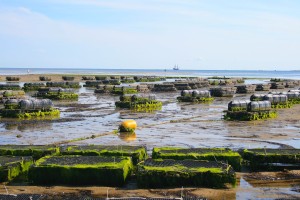
An oyster farm
An Oyster Farm
Shanghai: Global consumption of fish has increased by 122 percent since 1990 and aquaculture now accounts for more than 50 percent of current fish consumption. It is expected to rise above 60 percent during the next decade.
However, the impacts of the climate crisis and disruption to production and consumption caused by the COVID-19 pandemic have created challenges on the rate of growth and expansion of the Aquaculture sector, which is vital for feeding the world’s expanding population.
Hence, considering the critical role that aquaculture is playing in global food production, innovation and equity are required to ensure inclusive and sustainable growth. Highlighting aquaculture as the fastest growing agri-food sector globally, the Director-General of the Food and Agriculture Organization of the United Nations (FAO), QU Dongyu, said today that there is huge potential for its further expansion in Asia, Africa, Latin America and the Caribbean.
“Aquaculture production will continue to grow, but the benefits of this growth must be equitable and fairly distributed,” Qu stressed on the opening day of the two-day Global Conference on Aquaculture Millenium+20 in Shanghai. He noted the need to further develop “the human, social, cultural and economic dimensions of aquaculture”.
The conference, which is considering a range of issues and opportunities ranging from traditional family farming in vulnerable communities to cutting-edge technology, adopted the theme “Aquaculture for Food and Sustainable Development”, and will discuss innovation, genetic resources, biosecurity, the social and human dimension, value chains and market access. It is the fourth such conference to be held and is organized by FAO and China’s Ministry of Agriculture and Rural Affairs, together with the Network of Aquaculture Centres in Asia-Pacific (NACA).
The Shanghai Declaration, which is expected to be adopted at the conference, is a call to action that will shape the future of aquaculture and seek to optimize the sector’s contribution to global agri-food systems in line with the UN’s 2030 Agenda for Sustainable Development.
Qu further stressed aquaculture plays an important role in FAO’s new Strategic Framework 2022-2031 through its Blue Transformation priority programme, with the objective of supporting 35 to 40 percent growth in global aquaculture by 2030.
“FAO’s Strategic Framework is based on the principles of the Four Betters: better production, better nutrition, a better environment and a better life for all – leaving no one behind,” he said. “The Shanghai Declaration is a call for global action,” he added.
FAO recognizes the contribution of aquaculture to food security, by providing technical assistance through the implementation of the Code of Conduct for Responsible Fisheries. A key instrument that has been guiding the principles for sustainable fisheries and aquaculture around the world since 1995, the Code seeks to develop and implement efficient policies and legal frameworks which promote sustainable and equitable aquaculture development, especially in developing countries, with improved socio-economic benefits.
The Director-General said aquaculture could also play a key role in FAO’s Hand-in-Hand Initiative to accelerate agri-food systems transformation. Through the Global Sustainable Aquaculture Advancement Partnership, FAO is also collaborating with the Chinese Academy of Fishery Sciences.
Qu told the conference: “Aquaculture already plays an important role in “Leaving no-one behind” which means all our efforts and actions must focus on everyone everywhere, in order to end hunger and poverty.”
The sector needs to adopt an “holistic” approach with a focus on people and communities, specifically on the women, youth, elderly and indigenous communities who rely on aquaculture for their livelihoods, he said.
The Global Conference also heard opening addresses from Tang Renjian, China’s Minister for Agriculture and Rural Affairs; Frank K. Tumwebaze, the Minister for Agriculture, Animal Industry and Fisheries of the Republic of Uganda; Úrsula Desilú León Chempén, Vice Minister for Fisheries and Aquaculture, Ministry of Production of the Republic of Peru; Virginijus Sinkevičius, the European Commissioner for the Environment, Oceans and Fisheries; Huang Jie, Director-General of NACA and Peng Chenlei, Vice-Mayor of Shanghai.
– global bihari bureau




